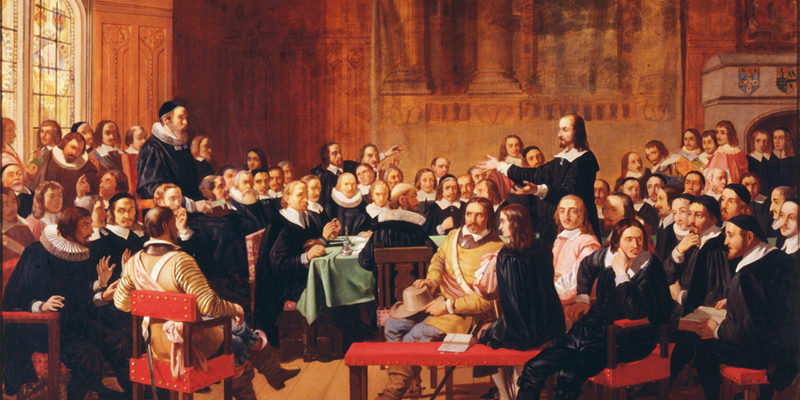
What The Puritans Taught This Builder About Ministry
You’d think having owned a construction company would be good preparation for serving as a pastor. Construction work is high-stress, project-driven work, full of timelines and schedules, like much church ministry. The Bible itself repeatedly uses language of construction to talk about the life of a local church – terminology taken straight out of a construction site. But for all the correspondence between the two, there is also a major difference, one that has already been a significant challenge to me.
I spent the first months of my pastorate frustrated by the lack of a clear touchdown. In project-driven work, the touchdown is obvious—completing the project on time and on budget, good craftmanship, and happy clients. But church members are not clients and a church is not a “project” that can be completed this side of eternity (2 Corinthians 11:2). Given this, what does a touchdown look like from week to week?
All Things Done for Building Up
On the one hand, the duties of the pastorate are clear. Paul’s charge to Timothy states plainly that a Pastor should “preach the word; be ready in season and out of season; reprove, rebuke, and exhort, with complete patience and teaching” (2 Timothy 4:2). But on the other hand, the pastorate consists of more than just cranking out the duties of the office. For instance, in 1 Corinthians 14:26 — “Let all things be done for building up” — the “all things” is not a choice between what is evil and what is good. It is a choice between lots of goods that can all be means of building up the church. In other words, there is the urgent need to discern from all these goods what will be best for building up the Church. There is a wisdom dimension in pastoral ministry, guiding our precious time and energy toward what is most advantageous for the bride of Christ and, therefore, the glory of Christ.
This wisdom dimension is where I still have much to learn from the Puritans. Conversion is not the high-point of our Christianity: conversion is 'but the beginning' of 'further comings' Click To Tweet
The typical Puritan pastor understood more than the duties of ministry.[1] He also understood the “touchdown” of ministry. Probably no one has articulated the Puritan understanding of ministry better than J.I. Packer in his 1990 book A Quest for Godliness. He writes:
“The end to which all church order, on the Puritan view, was a means, and for which everything superstitious, misleading and Spirit-quenching must be rooted out, was the glory of God in and through the salvation of sinners and the building up of lively congregations in which people met God.”[2]
Packer captures the essence of what I find so helpful and compelling about the Puritans. Their ministries had a definite aim, “lively congregations” where the glory of God’s salvation is obvious and the presence of God among His people is palpable. Who doesn’t want to be a part of that! This aim was not formulated in so many words or, to my knowledge, codified in a Puritan handbook. But it is easy to see how Packer arrived at this conclusion. Consider this exposition from Richard Sibbes (1577-1635) of Song of Solomon 5:1:
“Christ’s invitation by the church to come into his garden, with the end thereof, ‘to eat his pleasant fruits.’ . . . shew the church’s further desire of Christ’s presence to delight in the graces of his own Spirit in her. She invites him to come and take delight in the graces of his own Spirit; and she calls him ‘Beloved,’ because all her love is, or should be, imparted and spent on Christ, who gave himself to a cursed death for her. Our love should run in strength no other way, therefore the church calls Christ her ‘Beloved.’ Christ was there before, but she desires a further presence of him, whence we may observe that wheresoever grace is truly begun and stirred up, there is still a further desire of Christ’s presence; and approaching daily more and more near to the soul, the church thinks him never near enough to her until she be in heaven with him. The true spouse and the bride always, unless in desertion and temptation, crieth, ‘Come, Lord Jesus, come quickly,’ Rev. xxii. 20. Now, these degrees of Christ’s approaches to the soul, until his second coming, are, that he may manifest himself more and more in defending, comforting, and enabling his church with grace. Every further manifestation of his presence is a further coming.”[3]
A Further Coming
If you had asked me at the outset of my ministry to describe what a church “touchdown” looks like, I would have leaned heavy on conversions as the mark of vitality. And this is certainly an evidence of grace we ought to seek from God (Matthew 9:37).[4] We long to see Christ coming to sinners at the moment of conversion, breathing new life into dead bones. But do we also realize that, “Every further manifestation of [Christ’s] presence is a further coming”? Jonathan Edwards captures this idea wonderfully in a sermon on Romans 3:19—notice too the emphasis on liveliness, alluded to above in Packer:
“If you would have your comfort continued, and be lively Christians, you must be as earnest still, and as long as you live, as you [were when Christ first comforted you]; and be more and more, if possible, as being sensible that your conversion was but the beginning of your work, and not the finishing of it. If those that have lately been converted amongst us, do generally continue lively in Christianity, there is no danger of the work of God’s ceasing.”[5]
I am going to say something now that runs contrary to the Christianity I inherited from my fathers. Conversion is not the high-point of our Christianity: conversion is “but the beginning” of “further coming[s]”.
Like every warm-blooded Pastor I know, I long for conversions. I will never stop praying for more conversions. But the Puritans help me to also long for something more—ever deepening communion with Jesus in the context of a lively church.
Time and again, through the well-reasoned and careful exegesis of Scripture, the Puritans push me beyond the false limits of my low expectations for how wonderfully and powerfully Jesus can manifest His presence here and now in a “normal” church that is all-in with Him.[6] This is what makes the ministry of the Puritans so compelling to me. They are not so much discovering as rediscovering the Christianity that is really there in the pages of Scripture, the kind of Christianity that gets us past treating church as a project and increases our hunger for the real presence of Christ among His people. That’s the touchdown!
Endnotes
[1] Concerning the duties of pastoral ministry, Richard Baxter’s Reformed Pastor humbles the best among us. John Owen’s outline of the “The Especial Duty of Pastors of Churches” is another example of the high bar to which Puritan pastors sought to attain.
[2] Packer, A Quest for Godliness: The Puritan Vision of the Christian Life (Wheaton, IL: Crossway, 2010), 39.
[3] Sibbes, Works of Richard Sibbes (Carlisle, PA: Banner of Truth), 2:13–14. [Italics added]
[4] The Puritans themselves longed for conversions and compelled people to receive Christ in no uncertain terms. E.g., “If you refuse thus to receive Christ , how just is it that Christ should refuse to receive you!” See, Jonathan Edwards, Sermons and Discourses, 1734-1738 (WJE Online Vol. 19) , Ed. M.X. Lesser.
[5] Ibid., Sermons and Discourses, 1734-1738 (WJE Online Vol. 19) , Ed. M.X. Lesser. [Italics added]
[6] The closest modern parallel to what I have found in the Puritans is by Dane Ortlund, Gentle and Lowly: The Heart of Christ for Sinners and Sufferers (Wheaton, IL: Crossway, 2020).

